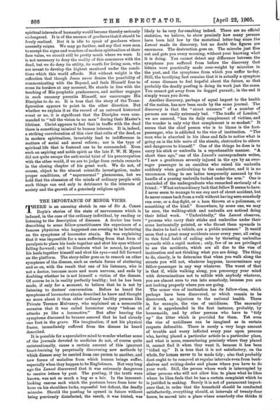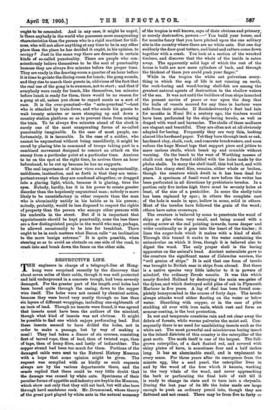THE IMPORTANCE OF MINOR VICES.
THERE is an amusing sketch in one of Sir A. Conan Doyle's stories of the state of nervousness which is induced, in the case of the ordinary individual, by reading or listening to the description of diseases. A doctor has been describing to some fellow-practitioners the experience of a famous physician who happened one evening to be lecturing on the symptoms of locomotor ataxia. He was explaining that it was impossible for a man suffering from that form of paralysis to place his heels together and shut his eyes without falling forward; and to illustrate what he meant, he placed his heels together himself and shut his eyes—and fell forward on the platform. The story-teller goes on to remark on other symptoms of the disease, such as certain forms of stuttering and so on, with the result that one of his listeners, who is not a doctor, becomes more and more nervous, and ends by doubting whether he is not himself a victim of the disease. Of course he is in reality perfectly healthy ; but be has been made, if only for a moment, to believe that he is not by listening to doctors' conversation. Before he beard the symptoms of locomotor ataxia described he knew and thought no more about it than other ordinary healthy persons like Private Terence Mulvaney, who explained on a memorable occasion that it was called locomotor ataxy " bekase ut attacks ye like a locomotive." But after hearing the symptoms discussed he became assured that he had already one foot in the grave. His imagination, if not his physical frame, immediately suffered from the disease he heard described.
It is possible for a speculative mind to wonder whether some of the journals devoted to medicine do not, of course quite unintentionally, cause a certain amount of this ignorant heart-burning by perpetually discovering new methods by which disease may be carried from one person to another, and new forms of maladies from which human beings suffer, especially when they happen to be Englishmen. Not very long ago the Lancet discovered that it was extremely dangerous to receive letters by post. The postbag, if the truth were known, was not so much a bag as a lair. In the innocent- looking canvas sack which the postman bears from hour to hour on his shoulders lurks, reposeful but defiant, the deadly microbe. Should the postbag be opened in future without being previously disinfected, the result, it was hinted, was likely to be very far-reaching indeed. There are no official statistics, we believe, to show precisely how many persons have been laid low by the matutinal letter-bag slime the Lancet made its discovery, but no doubt the figures are enormous. The destruction goes on. The microbe just flies out and gets you every morning, without your knowing what it is doing. You cannot detect any difference between the symptoms you suffered from before the discovery that letters were practically made over-weight by microbes in the post, and the symptoms from which you suffer to-day. Still, the tenifying fact remains that it is actually a symptom of some diseases to feel hopeful about the future, so that probably the deadly postbag is doing its work just the same. You cannot get away from its dogged pursuit; in the end it simply wears you down.
Another discovery, perhaps of equal import to the health of the nation, has now been made by the same journal. The discovery is that the "street manners" of a number of persons are really extremely bad. "The traffic of London," we are assured, "has its daily complement of victims, and the wonder is only why that complement is so modest." It seems that the chief person who is to blame is the foot- passenger, who is addicted to the vice of inattention. "The man who is absorbed in his ideas and fails to notice what is going on is the bete noire of the streets, obstructive to others and dangerous to himself." One of the things he does is to carry his stick or umbrella in a reprehensible manner. "A short time ago," one of the Lancet's correspondents writes, "I saw a gentleman severely injured in the eye by an over- eager passenger in an omnibus who raised his umbrella suddenly when gesticulating to the conductor, and it is no uncommon thing to see ladies temporarily annexed by the handle of a passing umbrella tucked under the arm." One is reminded of the undergraduate who remarked enviously of a friend : "What extraordinary luck that fellow B seems to have. I never seem to manage to see any sort of street accident, but he never comes back from a walk without having seen somebody run over, or a dog-fight, or a ham thrown at a policeman, or something of the kind." Somewhere, by some one, we may be sure, the walking-stick and umbrella are noticed doing their lethal work. "Undoubtedly," the Lancet observes, "persons who carry their sticks and umbrellas under their arms horizontally pointed, or who thrust them upwards in the desire to hail a vehicle, are a public nuisance." It would seem that a great many accidents occur every year, all owing to this fatal habit of calling cabs by thrusting umbrellas upwards with a rapid motion ; only, few of us are privileged to see the accidents, which are all due to the vice of inattention and not thinking what you are doing. The thing to do, clearly, is to determine that when you walk along the streets you will not, whatever happens, inconvenience any fellow-passenger in any way whatever. The worst of that is that if, while walking along, you preoccupy your mind with determinations not to collide with anybody whatever, you are almost sure to run into somebody, because you are not looking properly where you are going.
The minor vice of inattention has its fellow-vices, which perhaps have been discovered, or which remain to be discovered, as injurious to the national health. There is, for example, the vice of untidiness. The enormity of it is apprehended in the first instance, probably, by housemaids, and by other persons who have to "tidy up" the litter which is provided for them. Yet even the vice of untidiness can be imagined as in certain respects defensible. There is surely a very large amount of trouble and worry inflicted every year upon persons who, having placed a particular article in a particular place, and what is more, remembering precisely where they placed it, cannot find it when they want it, because it has been "tidied up." It is true that it is not satisfactory, on the whole, for houses never to be made tidy ; also that probably dust ought to be removed at regular intervals even from book- shelves and writing-desks and places where you have to do your work. Still, the person whose work is interrupted by other persons who will not allow him to place what he likes where he likes feels that he has a certain complaint which be is justified in making. Surely it is not of paramount import- ance that, in order that the household should be conducted satisfactorily, everything should, at intervals of twentrfour hours, be moved into a place where somebody else thinks it
ought to be concealed. And in any case, it might be urged, is there anybody in the world who possesses more exasperating characteristics than the person who is a rigid martinet for tidi- ness, who will not allow anything at any time to be in any other place than the place he has decided it ought, in his opinion, to occupy ? Just in the same way there are demerits in certain kinds of so-called punctuality. There are people who con- scientiously believe themselves to be the soul of punctuality because they are always five minutes before the proper time. They are ready in the drawing-room a quarter of an hour before it is time to go into the dining-room for lunch; the gong sounds, and they rise to march their guests in, oblivious of the fact that the real use of the gong is to summon, not to start ; and that if everybody were ready for lunch, like themselves, ten minutes before lunch is ready for them, there would be no reason for a gong at all, unless you chose to regard meals as a sort of race. It is the over-punctual—the "ante-punctual "—host who is attacked by train-fever, and who sends his guests to wait twenty minutes or more stamping up and down a country station platform so as to prevent them from missing the train. To be always five minutes ahead of the clock is surely one of the most exasperating forms of so-called punctuality imaginable. In the case of most people, un- fortunately, it is incurable. In the case of a soldier, who cannot be unpunctual without being unsoldierly, it might be cured by placing him in command of troops taking part in a combined movement designed to concert an attack on the enemy from a particular point at a particular time. Anxious to be on the spot at the right time, he arrives there an hour beforehand, to be cut up because he has no supports.
The real importance of minor vices such as unpunctuality, untidiness, inattention, and so forth is that they are unim- portant except when they are condoned altogether, or dragged into a glaring light, which, because it is glaring, tires the eyes. Nobody, hardly, has it in his power to create greater disorder than the hopelessly unpunctual man ; nobody is more likely to be unsatisfactory in other respects than the man who is abominably untidy in his habits as in his person ; nobody, probably, would be less disposed to respect the rights of property than the person who annoys other persons with his umbrella in the street. But if it is important that appointments should be kept punctually, none the less there are a few distinguished people in the world who may, perhaps, be allowed occasionally to be late for breakfast. There ought to be in such matters what Bacon calls "an inclination to the more benign extreme." It is quite possible, when steering so as to avoid an obstacle on one side of the road, to crash into and break down the fence on the other side.



































 Previous page
Previous page